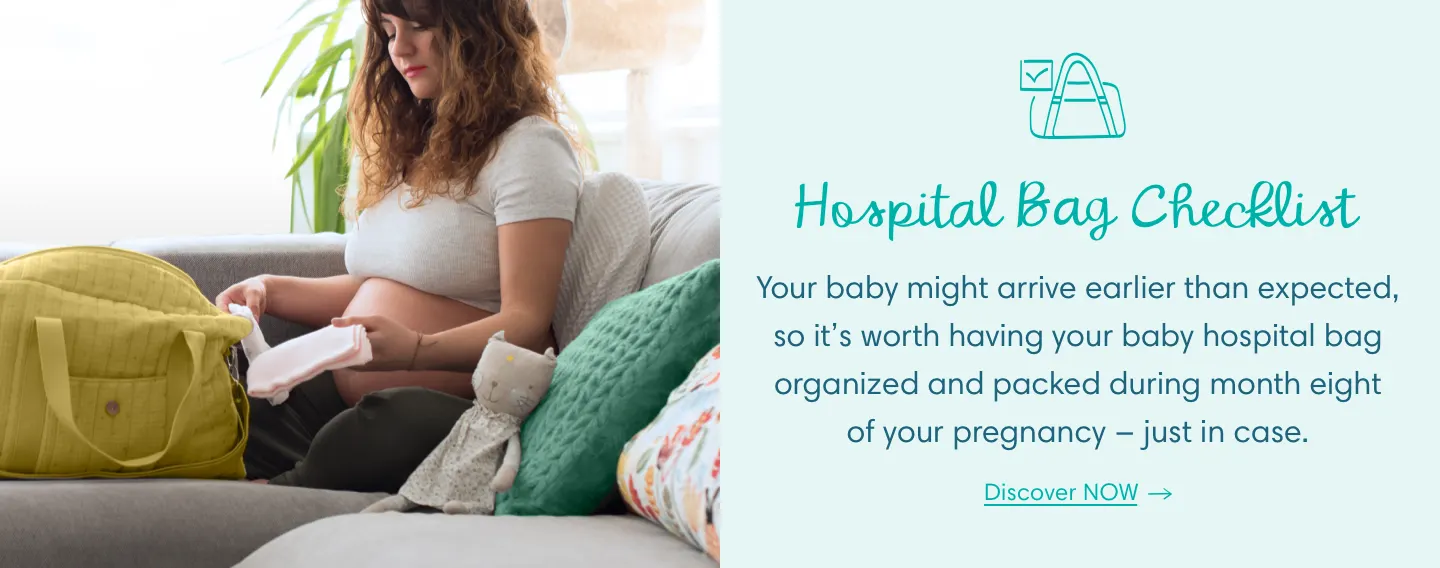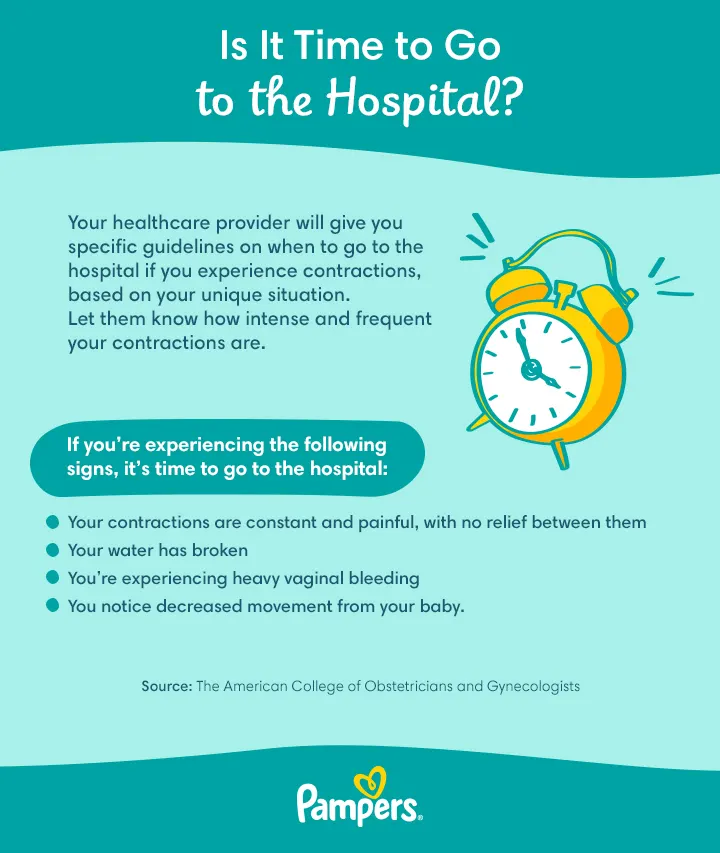What Do Contractions Feel Like?
During the final trimester of pregnancy, you might feel contractions or cramps and wonder if labour is starting. It may be difficult to distinguish between certain twinges and cramps, but we’re here to help clarify what contractions actually are, what they may feel like, and how “true” labour contractions compare to Braxton Hicks practice contractions. We’ll also provide some tips on managing contraction pain, and when to contact your provider. Plus, we’ve asked some parents to share their experiences with contractions and what they felt like for them.
What Are Contractions?
Contractions occur at the beginning of labour and are the body's means of pushing your baby down the birth canal and out into the world. They involve the muscles of your uterus tightening (contracting) and relaxing again, a process that helps to open (dilate) the cervix - the muscular organ that connects the uterus and the vagina—to allow your baby to pass through.
The Names for Different Contractions
You might hear these terms used for different types of contractions. Here’s a brief rundown of what they mean:
Braxton Hicks contractions. Contractions that come and go, and don’t result in you actually going into labour, are called Braxton Hicks contractions. You might also hear them referred to as false contractions or practice contractions.
True labour contractions. These are the kind that don’t go away and end with the birth of your baby. They are also called real or true labour contractions.
Preterm contractions. If you experience true labour contractions before your pregnancy is full term, these can be called preterm contractions. The word preterm is used when labour starts before 37 weeks of pregnancy. If you experience any of the signs of preterm labour, or if you're in any doubt at all about what you're feeling, contact your healthcare provider for an assessment.
What Do Labour Contractions Feel or Look Like?
“What do early contractions feel like?” “How will I know when I am having contractions?” or “Do contractions feel like period pains?” are all common questions as you approach your due date. However, it’s quite difficult to predict or describe what real labour contractions will feel like for you. This is partly because everyone’s experience of pain is different. For you, early contractions may feel quite painless or mild, or they may feel very strong and intense. The pain you feel can also differ from one pregnancy to the next, so if you’ve been in labour before you might experience something quite different this time around. It might be difficult to tell if you're experiencing labour contractions, but there are some signs that you can look out for. Here are a few possible indications of labour contractions:
Typically, labour contractions feel like pain or pressure that starts in the back or pelvis and moves to the front of your lower abdomen.
True labour contractions feel steadily more intense over time.
They come at regular intervals and get closer together over time.
Your belly will tighten and feel very hard.
Some pregnant people liken these contractions to menstrual cramps.
You may also experience pressure in your lower back and rectum.
If you’re wondering when to go to the hospital for labour, look out for the above signs and other signs of labour like your water-breaking, and contact your healthcare provider.
At any point, if you’re in doubt about what you’re experiencing, check with your provider. They will likely ask you some questions, and then advise you to either stay home and relax, come in for a checkup, or grab your hospital bag and get to the hospital for the birth of your baby.
Where Do You Feel Contractions?
So, where do contractions hurt, or where might you feel them? As we mentioned above, it’s typical to feel contractions in your back or pelvis that may move to your lower abdomen.
How to Ease Contraction Pain
To help manage the pain of contractions, you could try:
going for a walk
napping
having a shower or warm bath
doing some of the relaxation techniques you may have learned in childbirth classes.
It’s a good idea to discuss options for pain relief and other comfort measures during labour with your healthcare provider ahead of time. For example, some pregnant people choose pain medication like an epidural and others opt for non-medicated relief—or a combination of both.
Pain management is a very personal process and choice; you might even change your mind about what you’d like as your labour progresses. Keep an open mind and have a discussion with your provider about what you might like to have and what’s available to you.
What are your thoughts? Take our quiz on labour pain relief to tell us more!
What Other Moms (and One Dad!) Say Contractions Feel Like
We asked some parents “How painful are contractions?” and asked them to tell us what contractions felt like for them; here’s what they told us:
How Long Do Contractions Last?
During early labour, contractions may occur 5 to 15 minutes apart and last about 60 to 90 seconds each. It can help to time your contractions during early labour with a contraction tracking chart to see if they’re coming at regular intervals and continue even when you rest or move.
Later on, during active labour, your contractions will likely get closer together (2 to 3 minutes apart) and each contraction can last about 30 to 70 seconds each, but the average is about 45 seconds.
Difference Between Labour Contractions and Braxton Hicks
It can often be difficult to know precisely when you’re in labour and Braxton Hicks contractions may add to this confusion. So, what does a contraction feel like compared to Braxton Hicks? These “practice” contractions can happen in the weeks leading up to labour, but unlike real labour contractions, Braxton Hicks do not occur at regular intervals and tend to stop when you walk or rest. Learn more about the labour contractions and Braxton Hicks in our informative article.
What Causes Contractions?
It’s unclear exactly what causes contractions or labour to start, though hormonal changes may play a role. During labour, the hormone oxytocin is released, stimulating uterine contractions. These contractions then help to release more oxytocin, leading to more contractions, and so on. Oxytocin also increases levels of prostaglandins, which help to initiate labour. All of this helps get your body ready for delivering your baby.
What to Do When Contractions Start
When you start feeling contractions, it's essential to do what you can to remain calm and to remember that your body is designed to handle this! Here are a few steps you can take:
Contact your healthcare provider. Report that your contractions have started and relay any pertinent information such as the frequency and intensity of the contractions. The provider will provide guidance on when to come in based on your situation.
Track your contractions. Contractions come and go at regular intervals. Begin timing them from the start of one contraction to the start of the next. This will help determine when it's time to head to the hospital or birthing centre. If your contractions are constant and there’s no relief from the pain between each contraction, it’s probably time to go to the hospital.
Stay comfortable. Try to find a place where you can relax. Some people find walking, showering, or changing positions helpful in managing the discomfort.
Look for other signs of labour. If you’re unsure whether you’re experiencing real labour contractions, keep an eye out for other signs of labour such as your water breaking.
Remember, every labour experience is unique, and what works best for one person might not work for another. It's all about finding what helps you the most during this exciting time!
Can You Start Labour Contractions?
Contractions are a natural part of labour, and they generally start when your body is ready to give birth to your baby. Therefore, it’s important to trust in this process and to rely on your healthcare provider's advice.
There may be situations in which your healthcare provider will need to induce contractions/labour. These could come about because of medical reasons, a late or post-term pregnancy, or a decision made between you and your provider. Here are some methods that might be considered for inducing contractions:
Membrane stripping or sweeping. This procedure involves your healthcare provider separating the amniotic sac from the cervix to release hormones that may start contractions.
Artificial rupture of membranes (AROM). This procedure involves intentionally breaking the amniotic sac to stimulate contractions.
Oxytocin administration. This hormone can be given intravenously to induce or strengthen contractions.
When to Contact Your Healthcare Provider
If you suspect you’re in labour or you’re unsure, reach out to your healthcare provider right away. They can advise you when it’s time to go to the hospital based on the timing of your contractions and your other symptoms. You might be in labour if
contractions are constant, intense, and close together
you have heavy vaginal bleeding
your water breaks
your baby's movements have decreased.
If you experience any of the signs above, it’s probably time to head to the hospital.
If you start having contractions before 37 weeks pregnant, this may be a sign of preterm labour. It’s important to time your contractions to see if they’re regular. For example, if you feel contractions 20 minutes apart four times in a row, or eight times an hour, and they continue for over an hour, contact your healthcare provider immediately.
FAQS AT A GLANCE
Typically, contractions feel like a wave-like tightening across your belly that comes and goes at regular intervals, whereas baby movements often feel like kicks, jabs, or rolling.
The Bottom Line
It’s natural to be curious and even nervous about what contractions will feel like and whether you’ll know when labour has really begun. Remember, your healthcare provider is there to help you know when the time has come and what to do then. Plus, keep in mind that despite the pain and discomfort, labour contractions are helping to dilate your cervix and push your baby further down into your pelvis. Before long you'll be holding your newborn!
How We Wrote This Article The information in this article is based on the expert advice found in trusted medical and government sources, such as the American Academy of Pediatrics and the American College of Obstetricians and Gynecologists. You can find a full list of sources used for this article below. The content on this page should not replace professional medical advice. Always consult medical professionals for full diagnosis and treatment.
Join Pampers Club and get:






